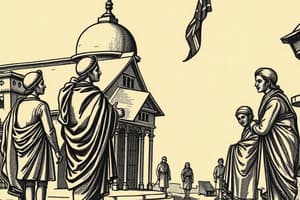Podcast
Questions and Answers
What is the maximum period for which a national emergency can remain in operation with the approval of Parliament?
What is the maximum period for which a national emergency can remain in operation with the approval of Parliament?
- Maximum period of four months
- Maximum one year
- Maximum period of six months (correct)
- Indefinite period
In case of a declaration of financial emergency, which statement is true?
In case of a declaration of financial emergency, which statement is true?
- All money bills of state will be considered only by the parliament
- State assemblies will be suspended permanently
- It can be passed by a simple majority (correct)
- All state governments will dissolve automatically
Which statement about the maximum period for President’s Rule is true?
Which statement about the maximum period for President’s Rule is true?
- It does not affect democratic processes
- It is limited to 1 year
- It can last indefinitely
- It can last up to 3 years (correct)
Which state has experienced the President's Rule imposed the maximum number of times?
Which state has experienced the President's Rule imposed the maximum number of times?
Which statement is true regarding the President’s ability to declare emergencies?
Which statement is true regarding the President’s ability to declare emergencies?
Which language is recognized as the official language of India as per the Indian Constitution?
Which language is recognized as the official language of India as per the Indian Constitution?
Which institution is established to safeguard and promote the rights of minorities in India?
Which institution is established to safeguard and promote the rights of minorities in India?
Under which provision does the Indian Constitution guarantee the right to education?
Under which provision does the Indian Constitution guarantee the right to education?
What authority is appointed to inquire into the conduct of the President and Union government officials?
What authority is appointed to inquire into the conduct of the President and Union government officials?
Is the establishment of a National Human Rights Commission (NHRC) included in the Indian Constitution?
Is the establishment of a National Human Rights Commission (NHRC) included in the Indian Constitution?
Flashcards are hidden until you start studying
Study Notes
Language in India
- Official languages include Hindi, English, Bengali, and Sanskrit, with English serving as a prominent language.
Minority Rights
- The National Commission for Minorities is established to safeguard and promote minority rights in India.
Right to Education
- The Constitution guarantees the right to education as a Directive Principle of State Policy.
Corruption Oversight
- The Central Vigilance Commission is created to investigate and examine corruption complaints against public servants.
Presidential Inquiry Authority
- The Lokpal is appointed to inquire into the conduct of the President and other Union officials.
Finance Commission
- The Indian Constitution establishes a Finance Commission responsible for distributing financial resources between the Union and States.
Human Rights
- The National Human Rights Commission (NHRC) is tasked with protecting and promoting human rights in India.
Freedom of Speech
- Article 19 guarantees the right to freedom of speech and expression.
State Public Service Commissions
- Each state has a Public Service Commission to conduct examinations for civil service appointments.
National Emergency
- A national emergency lasts up to six months, requiring parliamentary approval for extension.
Financial Emergency Declaration
- Financial emergencies can be enacted by a simple majority in Parliament.
President's Rule
- President's Rule can last a maximum of three years and does not affect citizens' Fundamental Rights compared to a National Emergency.
Frequent President's Rule
- Kerala has experienced President's Rule the most number of times among Indian states.
Internal Emergency Declaration
- The President can declare an internal emergency based on internal disturbances, while a national emergency can be proclaimed with cabinet recommendations.
Legislative Council Provisions
- The creation and abolition of Legislative Councils are covered under Article 169.
Maximum Assembly Size
- The maximum number of members in a State Legislative Assembly is 500.
Election Oversight
- The Election Commission of India conducts state assembly elections.
Directive Principles of State Policy (DPSPs)
- DPSPs are guidelines for governance and are not legally enforceable.
Compliance with DPSPs
- The State must work to ensure the well-being and welfare of its people.
Separation of Judiciary and Executive
- Article 50 promotes the separation of the judiciary from the executive in public services.
Implementation of DPSPs
- Articles 36 to 51 deal with the implementation of Directive Principles.
Contributions to DPSPs
- DPSPs are derived from Mahatma Gandhi's philosophy.
Leader of the House
- The Leader of the House in Lok Sabha is generally the Prime Minister, similar to the majority leader in the USA.
Quorum Definition
- Quorum refers to the minimum number of members required to be present in the House to conduct business.
Inter-Chamber Participation
- Ministers from Lok Sabha can participate in Rajya Sabha proceedings, and vice versa, but cannot vote in each other's houses.
Studying That Suits You
Use AI to generate personalized quizzes and flashcards to suit your learning preferences.




